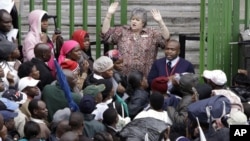Millions of Zimbabweans are facing serious problems such as xenophobia in South Africa but have over the years endured a lot of abuse in the hands of locals, including employers, police and the department of immigration.
Most of them prefer to risk being killed in xenophobia attacks than be safe back home.
The term xenophobia scares millions of foreigners, including Zimbabweans, living in South Africa. Some of them witnessed the killing of 62 people in 2008 and recent xenophobia attacks that left seven people dead and thousands homeless.
Some South Africans claim that foreigners are grabbing all jobs and operating businesses which are supposed to be for locals. Despite these sad memories, most Zimbabweans have vowed to stay put in South Africa, saying there is no democracy in their homeland.
Dumisani Nleya, who has lived in South Africa for many years, says to make matters worse, the Zimbabwe economy is almost collapsing.
“Dying from xenophobia is a better way of dying than dying at the hands of the Zimbabwean government. Death has never stopped people from seeking a better life because they are looking for better economic opportunities. So the solution to the whole thing of Zimbabweans coming to South Africa is by improving the economic situation in Zimbabwe.”
Hundreds of Zimbabweans left South Africa following xenophobic attacks in 2008 and sometime this year.
Arnold Nkala says the majority of his colleagues who fled the attacks are now back in South Africa.
“When they go back they find that the situation is still the same. It’s still unstable, so they see themselves again coming back again to South Africa. So even if there can be two million people that can be killed and two million can go back to Zimbabwe (but) as long as the situation does not change, the same two million are going to come and risk being killed this side because there is a higher opportunity of living this side than on the other side of the border.”
Nkala says lack of jobs and general freedoms is forcing them to stay in South Africa.
He says, “Even if people go back it’s not like they want to come back to South Africa, but the environment that they find themselves in, the instability of the politics and the instability of the economic situation are forcing them because people have to survive. If people are finding the environment not conducive for them to survive, they are forced naturally. It’s a natural thing to look for greener pastures.”
Bigfoster Nkomose echoes the same sentiments, noting that their lives entirely depend on Zimbabwe’s ruling elite.
Nkomose says, “They come silently, underground because they are running away from the government, corruption and everything. We know there is no clean government but they need to try. Not even an animal can live there. There are animals that you can’t find anymore.”
With Zimbabwe now rated by some organizations as one of the world’s poorest countries after 35 years of self-rule, most Zimbabweans say only fate will determine their destiny.





